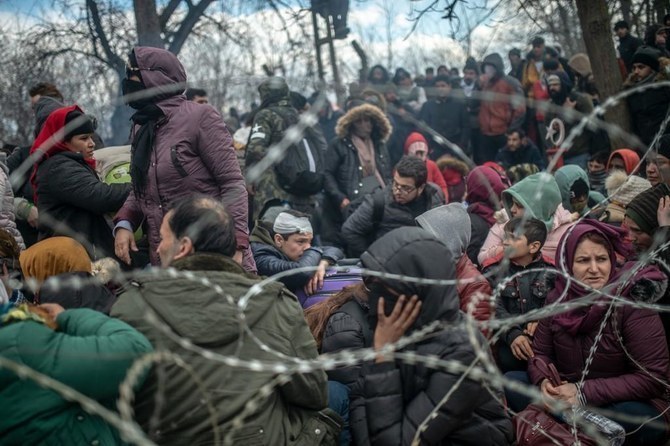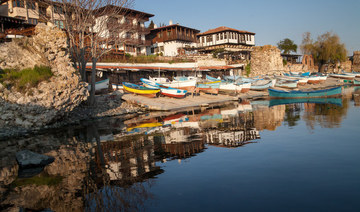LONDON: Authorities in Latvia have “brutally treated” refugees and migrants trying to cross the Belarus border, Amnesty International reported, warning that human rights violations have been committed, including arbitrary detention and torture.
Amnesty interviewed several Iraqi migrants who said they were subjected to violence, including beatings and electric shocks using tasers.
Eve Geddie, Amnesty International European Institutions Office director, said: “Latvia has given refugees and migrants a cruel ultimatum: Accept to return ‘voluntarily’ to their country, or remain stranded at the border facing detention, unlawful returns and torture. In some cases, their arbitrary detention at the border may amount to enforced disappearance.
“The Latvian authorities have left men, women and children to fend for themselves in freezing temperatures, often stranded in forests or held in tents.
“They have violently pushed them back to Belarus, where they have no chance of seeking protection.
“These actions have nothing to do with border protection and are brazen violations of international and EU law.”
Amnesty’s findings come a year after Latvia introduced emergency measures to cut the number of people arriving from the Belarus border.
The rules mean that Latvian authorities can deny arrivals the right to seek asylum — a violation of EU and international law.
Under the state of emergency, which has been continuously extended since its implementation, Latvian guards, police and military officials have engaged in a deliberate policy to violently return refugees and asylum seekers to Belarus, Amnesty warned.
Zaki, an Iraqi who stayed on the Latvian border, told Amnesty that he had been denied entry more than 150 times over the course of a three-month period.
Another Iraqi, Hassan, said: “They forced us to be completely naked. Sometimes they beat us when naked and then they forced us to cross back to Belarus, sometimes having to cross a river which was very cold. They said they would shoot us if we didn’t cross.”
Hassan was repeatedly threatened during his ordeal, and warned by a Latvian commando that he would be killed if he returned.
Another man, Omar, said he was beaten by an officer, who forced him to sign return papers: “He held my hand and said you should do the signature, and then with force, he made me do the signature.”
Latvian authorities also used makeshift tents to arbitrarily detain migrants, forcing them to stay in winter conditions outdoors where temperatures fall as low as -20 degrees Celsius.
Adil, from Iraq, told Amnesty: “We used to sleep in the forest on the snow. We used to light fire to get warm, there were wolves, bears.”
Amnesty also found that Latvian authorities regularly confiscated the mobile phones of arriving refugees and asylum seekers.
The organization warned that the combined phone-confiscation tactic and use of arbitrary detention could amount to a deliberate policy of enforced disappearance.
Geddie said: “Latvia, Lithuania and Poland continue to commit grave abuses under the pretext of being under a ‘hybrid attack’ from Belarus.
“As winter approaches and movements at the border have resumed, the state of emergency continues to allow Latvian authorities to unlawfully return people to Belarus.
“Many more could be exposed to violence, arbitrary detention and other abuses, with limited or no independent oversight.
“Latvia’s shameful treatment of people arriving at its borders presents a vital test for European institutions, which must take urgent measures to ensure that Latvia ends the state of emergency and restores the right to asylum across the country for everyone seeking safety, irrespective of their origin or how they crossed the border.”
























